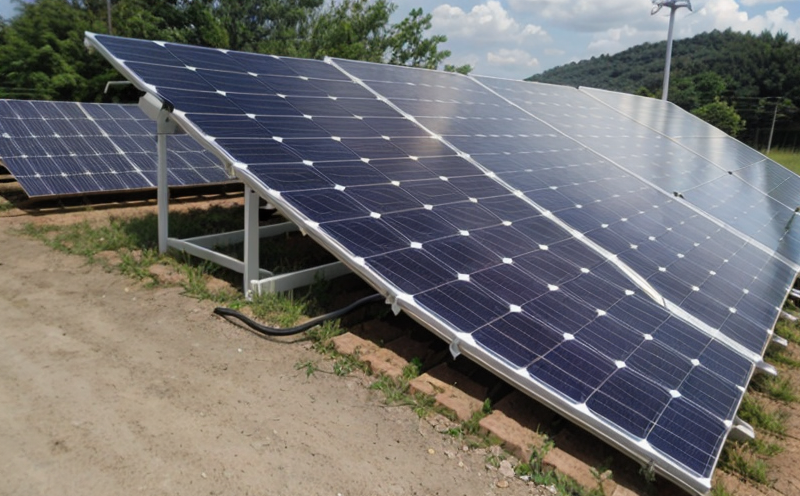IEC 61730-2 Outdoor Exposure Safety Testing
In the realm of renewable energy, solar panels and photovoltaic (PV) modules play a pivotal role in harnessing sunlight to generate electricity. The IEC 61730-2 standard is critical for ensuring the safety of these devices, especially during outdoor exposure testing. This service ensures that solar panels and PV modules meet stringent safety requirements before deployment in real-world conditions.
The IEC 61730-2 standard specifies tests to ensure that photovoltaic (PV) devices are safe when subjected to outdoor exposure. These tests aim to identify potential hazards, such as electrical shock risks, which could arise from the operation of PV systems under extreme environmental conditions. Outdoor exposure testing is essential for verifying the long-term reliability and safety of solar panels in real-world applications.
The standard covers a range of parameters that must be evaluated during testing. These include insulation resistance, creepage distance, air gap, and other electrical characteristics critical to ensuring safe operation. The tests are designed to simulate the environmental conditions that PV modules will encounter throughout their operational lifetime, including variations in temperature, humidity, and UV radiation.
The testing process involves subjecting the solar panels or PV modules to a series of outdoor exposure scenarios. This can include prolonged periods under direct sunlight, rain, snow, and other environmental stressors. The aim is to replicate real-world conditions that might cause degradation or failure in the long term. By conducting these tests, we can ensure that the products meet the highest safety standards, preventing potential hazards associated with electrical shock.
The IEC 61730-2 standard is internationally recognized and widely adopted by manufacturers, regulators, and quality assurance professionals. Compliance with this standard is crucial for ensuring product safety and reliability in a variety of applications, from residential solar installations to large-scale industrial PV systems.
During the testing process, we use specialized equipment designed to replicate outdoor environmental conditions. This includes climate chambers that can simulate various weather patterns, such as rain, snow, and high humidity levels. The tests are conducted over an extended period to ensure that any potential issues or weaknesses in the design become apparent.
The results of these tests are crucial for quality managers, compliance officers, R&D engineers, and procurement teams who need to verify that their products meet international safety standards. By ensuring that solar panels and PV modules pass these rigorous tests, we help manufacturers maintain a high level of product integrity and customer satisfaction.
Industry Applications
The IEC 61730-2 standard has widespread applications across various sectors. Here are some key industries where this testing is particularly relevant:
- Renewable energy sector, including solar power generation and photovoltaic technology.
- Battery storage systems for renewable energy applications.
- Solar water heating systems.
| Industry Segment | Specific Application |
|---|---|
| Renewable Energy | Testing of solar panels and photovoltaic modules for outdoor safety compliance. |
| Battery Storage Systems | Validation of battery systems used in conjunction with renewable energy sources to ensure safe operation. |
| Solar Water Heating | Assurance that solar water heating systems meet the highest safety standards for consumer protection. |
By ensuring compliance with IEC 61730-2, manufacturers and installers can demonstrate their commitment to quality and safety, thereby gaining a competitive edge in these sectors. This testing is essential not only for regulatory compliance but also for enhancing the reputation of companies involved in renewable energy technologies.
Competitive Advantage and Market Impact
The implementation of IEC 61730-2 Outdoor Exposure Safety Testing provides significant competitive advantages and market impact:
- Enhanced Reputation: Compliance with international standards boosts a company's reputation, attracting more customers and investors.
- Regulatory Compliance: Ensures that products meet stringent safety requirements set by regulatory bodies worldwide.
- Increased Market Share: By ensuring product reliability and safety, companies can increase their market share in competitive markets.
- Customer Trust: Demonstrating adherence to international standards builds trust with customers, leading to long-term relationships.
The testing process not only ensures that products meet the highest safety standards but also helps manufacturers stay ahead of regulatory changes and technological advancements. This proactive approach to quality control can be a significant differentiator in the market.
Use Cases and Application Examples
The IEC 61730-2 standard is applicable across various use cases, including:
- Residential Solar Installations: Ensuring that solar panels meet safety standards for homes.
- Commercial PV Systems: Testing large-scale installations to ensure they are safe and reliable.
- Rooftop Solar Projects: Verifying the safety of solar systems on rooftops in urban environments.
In residential settings, compliance with IEC 61730-2 ensures that homeowners can trust their solar panels to operate safely. For commercial installations, this testing is critical for ensuring large-scale projects meet rigorous standards. Rooftop solar projects benefit from the same level of scrutiny, providing peace of mind for both installers and property owners.
The results of these tests are crucial not only for regulatory compliance but also for enhancing the reputation of companies involved in renewable energy technologies. By demonstrating adherence to international standards, manufacturers can differentiate themselves in a competitive market, leading to increased customer trust and satisfaction.





